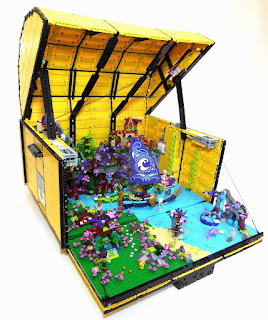
Anika Vuurzoon is a graduate student undertaking Mechanical Engineering at Eindhoven University of Technology in the Netherlands. She is well-known for her robotic animals as well as for bringing LEGO Friends and LEGO Elves sets to life with the incorporation of LEGO MINDSTORMS. Anika shares her creations all around the world including at the World Robot Olympiad. Anika’s entire family enjoys building with LEGO. They have a strong passion for nature & technology. Anika was one of the top prize winners of the Alexa-MINDSTORMS contest.
How did you get started building with LEGO bricks?I started building with LEGO bricks as a child, and simply never stopped with it. My entire family (Mom, Dad, Ganddad, Sister) build with LEGO, and we build a lot together.
 Which project or projects are you the most proud of? Why?
Which project or projects are you the most proud of? Why?The Elves Treasure Chest. With this project kids have to solve a small puzzle, but it’s also a nice robot to just watch in case there are more kids than puzzles. The project also contains a lot of details which refer to the story of the LEGO elves. The LEGO designers loved my chest so much that they asked me to make a copy of it which is now in Billund.
Where do you find inspiration for new projects?Everywhere! New LEGO sets, games, animals, kids playing with my robots at events…
How many iterations do you typically go through when you create your projects?I start with an idea and a brainstorm session, for this I discuss a lot with my Dad who also builds with LEGO. After that, I look for more details to the subject, in case of the treasure chest I had to read the story behind the LEGO Elves. When building the Shark or the Duck I looked on the Internet for information about the look and behavior of these animals.
The next step is to make a prototype. Often I don’t have enough bricks to build the entire project, so I make a prototype with the bricks I have, which results in a multicolor duck for example. When the prototype is finished I order the right bricks, to make the duck white instead of all kind different colors. When the brick arrive I finish the project.
“Often I don’t have enough bricks to build the entire project, so I make a prototype with the bricks I have…”
Do you document your creative process? If so, how and why?I don’t document the process of my project, only the end result. For every project I make a YouTube video which you can find on my channel.
What role does failure have in your creative process?
Failure happens with every project and can be really annoying. But it makes you think longer about the project, which often results in a better solution for the problem.
Failure happens with every project and can be really annoying. But it makes you think longer about the project, which often results in a better solution for the problem.
 How do you evaluate your success?I often do an evaluation of my project with my Dad, mostly when I’m still working on the project. Someone else’s opinion really helps you to keep thinking about solutions, which makes the robot work better and look nicer. When a robot is finished I show them at events to kids and their parents. Their opinions show me how nice it is to play with the robot and how good the robot looks.
How do you evaluate your success?I often do an evaluation of my project with my Dad, mostly when I’m still working on the project. Someone else’s opinion really helps you to keep thinking about solutions, which makes the robot work better and look nicer. When a robot is finished I show them at events to kids and their parents. Their opinions show me how nice it is to play with the robot and how good the robot looks.
For students who are ready to go beyond the basics, what project would you recommend to get them motivated, without overwhelming them?
Try to make a robot that behaves like an animal. Start with a robot that avoid obstacles. And then add functions as random speed, making turns/sounds at random moments. Let the robot react on people, for instance with the touch sensor.

Try to make a robot that behaves like an animal. Start with a robot that avoid obstacles. And then add functions as random speed, making turns/sounds at random moments. Let the robot react on people, for instance with the touch sensor.

What’s your favourite building technique?I like to combine Technic bricks with normal LEGO bricks. I use the Technic bricks for the movements and use the regular LEGO bricks for making the robot look nice.
You can view Anika’s creations on her family’s YouTube channel.
[Original article written in LEGO Engineering. Reposted here with author's permission.]
[Original article written in LEGO Engineering. Reposted here with author's permission.]